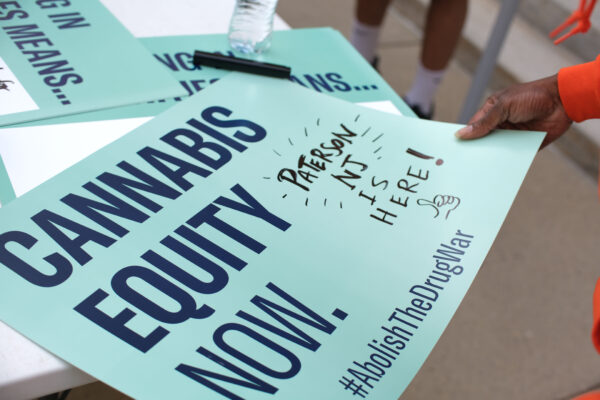This 4/20, we’re reminded of the progress we've made in ending the drug war in New Jersey over the past few years. Though more work remains to ensure that New Jersey lives up to its promises of justice and equity in the cannabis space, the progress we’ve seen since legalizing and decriminalizing marijuana in a way that prioritizes racial and social justice has proven what we at the ACLU-NJ have always known: transformative change is possible, and it is the springboard to implement even more comprehensive reforms going forward.
There is still a far way to go to achieve our affirmative vision for the future. We’re calling for the removal of all criminal and civil penalties related to drug use because New Jersey has an obligation to end the drug war policies that have long harmed New Jerseyans and replace them with forward-thinking, evidence-based solutions that advance public health and racial justice.
The drug war has devastated communities since the 1800s and has always promoted white supremacy.
The drug war is a series of laws and policies that criminalize people for using or selling drugs. The first punitive drug laws were created in the late 1800s to target Chinese immigrants, and similar laws followed that targeted Mexican Americans and migrants and Black Americans. The very root of drug policies in this country have always been about targeting communities of color and using criminalization as a tool to systematically deny people their rights and access to opportunity. Since its inception, the drug war has promoted white supremacy.
The modern-day drug war, launched in 1971 under President Nixon to similarly target civil rights and anti-war activists and expanded throughout the 1980s and 1990s, has infused funding into the criminal legal system at devastating costs – expanded access to military equipment for police departments, increased resources for prosecutors, and the rise of mass incarceration across the country. Policies targeting people for drug use and sale have played out the way nearly every policy in our criminal legal system has – they have disproportionately harmed Black and brown people.
In New Jersey, Black people are 3.3 times more likely to be arrested for a drug war violation than white people, despite similar rates of use. In a state that already has the nation’s worst racial disparities in its prisons, New Jersey incarcerates Black residents at a rate 12.5 times higher than white residents – and policies that disproportionately target Black communities only exacerbate already alarming disparities. Removing criminal and civil penalties for drugs must include ending unnecessary arrests, racial disparities, and the consequences they bring – the impact of arrests and convictions reverberate throughout people’s entire lifetimes and create barriers to opportunity in housing, education, employment, immigration, and more.
Drug war enforcement also comes at a massive financial cost. In 2019 alone, New Jersey’s spending on drug war enforcement was 8.5 times higher than its investment in addiction services and 27.9 times higher than its investment in rental assistance, homeless shelters, homelessness prevention, and lead abatement combined. It’s past time for New Jersey to invest in a public health approach that supports our families and communities instead of criminalizing them at an immeasurable human cost.
Our vision for a post-drug war future prioritizes public health and racial justice.
Under drug war policies, when someone is using or selling drugs, the primary response by the state is criminalization. Yet over fifty years of data show us that criminalization does not deter drug use or drug sale and that it does not prevent overdose deaths, which are at an all-time high in New Jersey.
What the evidence does tell us is that a public health approach to drug use can keep our communities safe and healthy. Instead of continuing to criminalize people, the State can invest in the kinds of resources that help communities thrive – housing, education, access to non-coercive treatment and harm reduction resources. We must take a holistic approach when implementing comprehensive solutions in place of drug war policies. Our communities deserve to be supported without the immeasurable harm caused by decades of criminalization.
Revenue from cannabis - already promised for reinvestment in the communities most harmed by marijuana criminalization - is an opportunity for that state to begin addressing decades of disinvestment, but only if decisions are driven by a transparent, community-led process, including public tracking of revenue spent and annual reporting on reinvestment, are incorporated into the process. With tens of millions of dollars on the table - and eventually hundreds of millions of dollars as the industry grows - each year, community members must be centered at every step of the process.
We’ve made progress in ending the drug war in New Jersey, but we must go further.
By decriminalizing and legalizing marijuana in 2020, New Jersey has taken a first step toward a future without drug war policies. Before decriminalization, there were over 36,000 marijuana-related arrests in New Jersey each year. For many New Jerseyans, these arrests were a gateway into the criminal legal system. As a result of decriminalization and legalization, criminal and civil penalties have been removed for possession under six ounces and new policies encouraging a public health approach to youth drug use have been implemented. And importantly, over 360,000 prior records have been expunged and policies have been created to prevent discrimination in employment and mortgage lending against those with prior marijuana use. This is a model for future actions: New Jersey must continue adopting measures that not only decriminalize, but that are also retroactive in nature.
You can help end the drug war by urging your lawmakers to adopt public health policies.
The ACLU-NJ and partners are working on policies to remove criminal and civil penalties associated with drug use and adopt reparative measures to ensure that people who have been harmed by the decades of failed drug war policies aren’t continuing to be harmed going forward.
You can join us: tell your lawmakers: it’s long past time to end drug war-style penalties in New Jersey. We must build a future founded on public health and racial justice.


